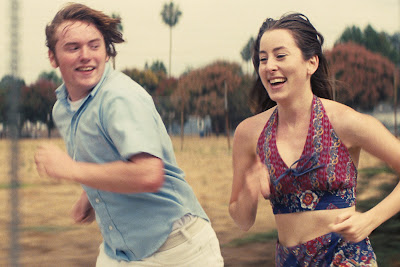Sometimes, it's all about the navigation, be it winding around the islands near Hiroshima or figuring out just how you're going to deal with things left undone and unsaid which can never be completed. Those are just two of the themes in Ryusuke Hamaguchi's Drive My Car, which is easily among the best films we've seen at the Michigan/State Theater in the past year. I'm certainly a fan of Japanese cinema, as my lifelong affection for Akira Kurosawa will attest, but this goes beyond my fondness for the style (which this film maintains) and instead is simply a response to a story well told, well acted, and so emotionally present that I couldn't help but feel echoes to the turns my own path has taken, both recent and well in the past.
Yûsuke Kafuku (Hidetoshi Nishijima) is a theater actor whose wife, Oto, is a screenwriter who develops ideas through sex and not always just with Yûsuku. Struggling with his own feelings of betrayal competing with his devotion to her, he's not present when she dies suddenly and he's left to deal with his feelings of frustration and survivor's guilt. When he agrees to direct a production of the Anton Chekov play, Uncle Vanya, which he's previously performed in the title role, he encounters not only one of his wife's former lovers among the cast, but a woman assigned to him as a driver, Misaki Watari (Tôko Miura), under the theater company's regulations, which disrupts his usual method, his self-enforced distance from others, and the last real connection he has with Oto, who recorded lines for him to listen and respond to while he drove. Misaki has her own deep-rooted problems from her past and the film ends up being a depiction of how they try to struggle through those issues, with the shadow of Chekov's work all around it.
At its root, this is just a great story, which is always the baseline test for me with any film. It's not especially complex or elaborate on the surface level, as its mostly about the basic relationships and emotions that almost every human encounters and frequently struggles with. But it becomes complex because of its depth and because of the passion with which its expressed, not only by the two leads, but also by a couple of their co-stars, especially Masaki Okada as Kôji Takatsuki and and Park Yoo-rim as Lee Yoo-na, who communicates only through Korean sign language throughout the film. Indeed, language is a key element, as Yûsuke prefers to mix languages in his productions, so that the actors performing Uncle Vanya are speaking in their native tongues, whether that be Japanese, Korean, Mandarin, Tagalog, or Malay. It's this natural flow of communication for the speaker which is sometimes unintelligible to the listener that is perhaps the best euphemism for the difficulties of conveying emotion, even for those who've been bonded for a long time; sometimes especially for them.
Nishijima is fantastic as the primary (ahem) vehicle of the film, as all of our action is from his vantage point, and he never once slips into melodrama or emotion for its own sake, even as he portrays the rather self-righteous and demonstrative title character of Chekov's. You can always see the vulnerability of a person so tortured by their longing for someone who hurt them so terribly but it never rises to a rending-of-sackcloth level. Certainly, that's within the style of Japanese drama, so it can't be too surprising, but it's still a brilliant performance. Likewise, the cavernous pain of Miura's eyes, even when she begins as the strictly professional employee and gradually slips into the role of someone who clearly sympathizes with Yûsuke's pain, not only because it mirrors her own but simply because she's a human being who understands that internal conflict, is fascinating to watch. Combining those standout performances with the excellent thematic visuals of roadways, tunnels, and a lonely pair of headlights in the pitch blackness of the Chûgoku countryside is a genuinely standout example of craftsmanship by Hamaguchi and cinematographer, Hidetoshi Shinomiya. One interesting choice in that respect was what may have been the longest cold open of any film I've ever seen, as the credits only appeared a third of the way into the film's three hour runtime; every minute of which was worth it.
Indeed, there was a point about a half hour from the end, when the two leads were reaching something of a crux point in both their own relationship and their understanding of the most important past ones (Oto for Yûsuke and her mother for Misaki) when I had a personal reflection on emotional communication that, as always, in hindsight seems blindingly obvious but which is just a feature of the human condition that makes us sometimes unable to take the simplest steps. But just like the characters in Drive My Car and those in Uncle Vanya, the eventual message is that you have to push through those barriers and the pain and the confusion because, in the end, the show must go on. This is when you know you've encountered a great story that makes you think about things larger than yourself, but which may, in the end, be just about yourself and how you interact with the world around you and especially the other humans who inhabit it. I can't say enough positive things about this one, as you've probably realized by now. Spectacular.


















